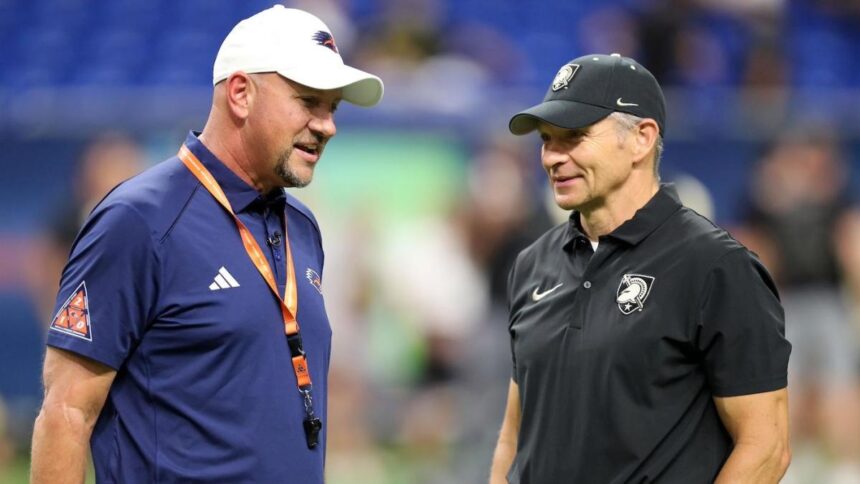ARLINGTON, Texas — Army football has been defined by its independence. Other than a seven-year stint in Conference USA, the Black Knights played without a football league affiliation since the program’s inception in 1890. But while Army football has tried to maintain, the sport has changed around them.
The Black Knights got an unfortunate taste of the changes three years ago. They were scheduled to play Tennessee, but just 11 months before the game the Vols bought out the contest and replaced the Black Knights with Akron for an easier win. Army was unable to find an FBS replacement and ultimately scheduled Villanova, a second FCS opponent for the year.
At the end of the year Army won six games, including the all-important rivalry contest against Navy. However, since two of the wins were against FCS opponents, the Black Knights missed a bowl.
“Scheduling has become a real challenge and a lot of that has been driven by the changes in college football,” Monken told CBS Sports. “As those teams are changing conferences, their schedules have to change and there’s a huge trickle-down effect.”
In 2024 Army makes its debut as the newest member of the American Athletic Conference. The Black Knights are the seventh addition over the past two seasons and push the league to a stable 14 teams. While coaches certainly were wary about defending Army’s option offense, there was unanimous excitement about bringing a program of this caliber.
“I think it speaks to the athletic leadership of this conference,” FAU coach Tom Herman said. “As the athletic world blew up, the conference said hey, you six (former Conference USA schools), come here. ‘Hey Army, you’re looking for a home? We’ve got you.’ They’re very calm, very calculated in terms of the leadership of this conference.”
UTSA coach Jeff Traylor has coached against Army four times since taking over the program in 2019. Despite all the Roadrunners’ success, he is just 1-3 against the Black Knights. San Antonio has a substantial military population, so the matchups at the Alamodome have been packed. UTSA linebacker Jamal Ligon said he hopes the game can develop into a long-term rivalry.
“They’re a pain in our butt, let’s be honest,” Traylor said. “I tell my players, they’re the only program that has been more physical, mentally tough than we have. Our guys have been reminded of that as a compliment to Army. … I think it’s a great addition. They’re about the right stuff.”
Tulane coach Jon Sumrall coached against Monken and Army each of the past two years while at Troy. After his 19-0 win over Monken’s Black Knights last season, he joked that he was relieved to get away from defending Army’s option attack for a while.
“What they do presents challenges schematically and physically,” Sumrall told CBS Sports. “I care deeply about people who serve, I think we all have an affinity for people that served, [but] I can’t say it’s one that I’m excited to coach against.”
Perhaps most eyes turned to Navy after Army made the decision to join. The Midshipmen have competed at a high level in the conference, including three division titles since 2015. The AAC office also ensured that the annual Army-Navy contest, one of the biggest games in the sport, will remain an out-of-conference matchup. AAC commissioner Tim Pernetti described it as bigger than any one conference.
“I think it’s outstanding for our conference,” Navy coach Brian Newberry said. “(I have) so much respect for Army and their players, they’re our brothers. The great thing is that it doesn’t affect the integrity of our game. It’s awesome to have them here.”
Army’s move to the AAC is just the latest in a recent acceleration of realignment in college football. As of 2022, there were seven FBS independents. Since then, Liberty and New Mexico State joined Conference USA, BYU headed to the Big 12, Army is in the American and UMass is one year away from rejoining the MAC. Only Notre Dame and UConn plan to remain unaffiliated.
Perhaps no dynamic has sped the process up faster than the expanded College Football Playoff. Access to the Group of Five auto-bid means that technically, every team in an FBS conference has access to the field.
The message is only more important in a recruiting space that’s getting tougher for service academy schools. The pool of prospective players is incredibly small. Recruits must meet all the requirements for a service academy, from height and weight to academics to those willing to serve a military career after graduating. Previously, Navy and Air Force could tell service academy recruits that there is a pathway to national contention. Now, Army can too.
“Not that I’m delusional and feel like we’re going to be the team that makes the College Football Playoff,” Monken said. “But to able to say we have a path to the playoff is important because Navy’s in a conference, Air Force is in a conference; they can say, we’ve got a path to the playoff. They’ve not made the playoff either, but win the conference and the opportunity is there. It was important for us to be in that conversation.”
After years of Army putting together messy, chaotic schedules, the 2024 version looks downright normal. The nonconference games are against FCS Lehigh, Air Force, Navy and Notre Dame.
The Black Knights hope this is just the start of a new era of stability for the program.
“I think at the Group of Five level, the American Athletic Conference is the pinnacle of the Group of Five conferences,” Monken said. “It is the best league in the Group of Five. I think this league would be a desirable landing spot for others in the Group of Five that want to move up. I think it would be a move up for many of them to come to this league.”











